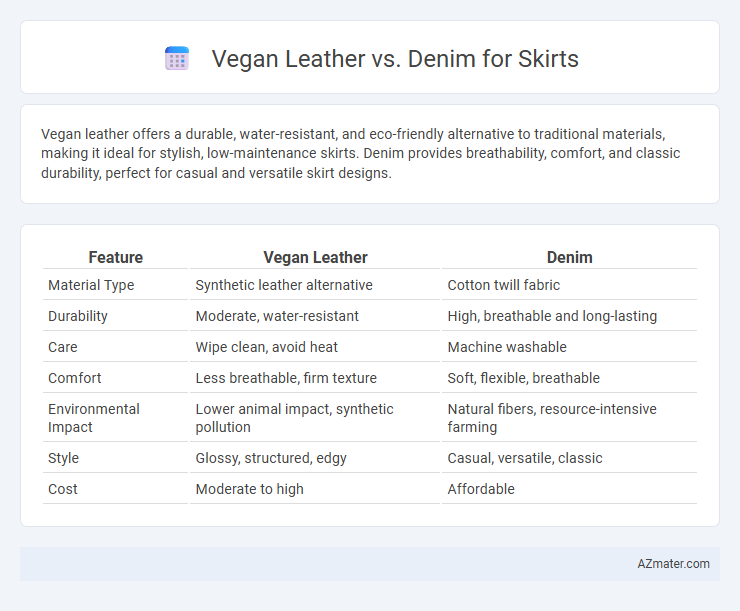Vegan leather offers a durable, water-resistant, and eco-friendly alternative to traditional materials, making it ideal for stylish, low-maintenance skirts. Denim provides breathability, comfort, and classic durability, perfect for casual and versatile skirt designs.
Table of Comparison
| Feature | Vegan Leather | Denim |
|---|---|---|
| Material Type | Synthetic leather alternative | Cotton twill fabric |
| Durability | Moderate, water-resistant | High, breathable and long-lasting |
| Care | Wipe clean, avoid heat | Machine washable |
| Comfort | Less breathable, firm texture | Soft, flexible, breathable |
| Environmental Impact | Lower animal impact, synthetic pollution | Natural fibers, resource-intensive farming |
| Style | Glossy, structured, edgy | Casual, versatile, classic |
| Cost | Moderate to high | Affordable |
Introduction to Vegan Leather and Denim Skirts
Vegan leather, made from synthetic or plant-based materials, offers an animal-friendly alternative to traditional leather with a smooth, polished appearance that enhances skirt designs. Denim, crafted from durable cotton twill, provides a classic, textured fabric known for its versatility and timeless appeal in skirt fashion. Both materials serve distinct aesthetic and functional purposes, influencing comfort, sustainability, and style choices for skirts.
Material Origins and Sustainability
Vegan leather, typically made from polyurethane or plant-based materials like apple peels or cork, offers a cruelty-free alternative to traditional animal leather with lower environmental impact in terms of water and land use. Denim, woven from cotton fibers, requires significant water consumption and pesticide use, but advancements in organic and recycled cotton production improve its sustainability profile. Choosing between vegan leather and denim for skirts depends on prioritizing renewable plant-derived materials or durable natural fibers with evolving eco-friendly cultivation practices.
Environmental Impact Comparison
Vegan leather, typically made from polyurethane or plant-based materials like pineapple leaves and cactus, generally has a lower water footprint and fewer toxic chemical emissions than traditional denim, which relies heavily on water-intensive cotton cultivation and pesticide use. The production of denim results in significant water pollution and soil degradation due to dyeing processes and intensive farming methods. Choosing vegan leather skirts can reduce environmental impact by minimizing water consumption and chemical runoff, supporting more sustainable fashion alternatives.
Comfort and Wearability Factors
Vegan leather skirts offer a sleek, smooth texture with moderate breathability, making them suitable for cooler weather but potentially less comfortable in heat or prolonged wear. Denim skirts provide high durability and breathability, ensuring excellent comfort and flexibility for everyday use and warmer climates. Both materials impact wearability differently, with vegan leather emphasizing style and water resistance, while denim excels in comfort and long-term wear resilience.
Style Versatility and Aesthetic Appeal
Vegan leather skirts offer a sleek, edgy aesthetic that adapts well to both casual and formal styles, making them highly versatile for modern wardrobes. Denim skirts provide a timeless, relaxed look with classic texture, easily styled for day-to-day wear or layered for a more polished outfit. Both materials enhance skirt designs with distinct visual appeal, where vegan leather emphasizes sophistication and denim centers on comfort and durability.
Durability and Longevity
Vegan leather offers superior water resistance and maintains its shape longer than denim, making it highly durable for skirt use. Denim skirts, made from tightly woven cotton fibers, provide excellent breathability and become softer with wear, but may fade and weaken over time. Both materials have unique longevity traits; vegan leather resists stains and tearing, while denim withstands repeated washing and maintains structural integrity with proper care.
Maintenance and Care Requirements
Vegan leather skirts require gentle cleaning with a damp cloth and mild soap, avoiding harsh chemicals to prevent material cracking. Denim skirts offer more durability and can be machine washed, though washing inside out and using cold water preserves color and fabric integrity. Proper care for vegan leather extends its lifespan and maintains texture, while denim benefits from regular washing to remove dirt and reduce odor.
Price Point and Accessibility
Vegan leather skirts generally come with a higher price point due to synthetic materials and ethical production processes, while denim skirts are more affordable and widely available across various retailers. Denim offers greater accessibility thanks to its mass production and popularity in casual wear, making it a budget-friendly option for most consumers. The price difference and availability often influence shoppers' choices between sustainable vegan leather and classic denim skirts.
Ethical and Cruelty-Free Considerations
Vegan leather skirts offer a cruelty-free alternative by eliminating animal suffering and reducing environmental impact associated with traditional leather production. Denim skirts, while often made from natural cotton, can involve intensive water use and pesticide pollution in conventional farming. Choosing vegan leather or organic, sustainably sourced denim supports ethical fashion practices that prioritize animal welfare and sustainable resource management.
Conclusion: Which Material is Best for Skirts?
Vegan leather offers a sleek, durable, and water-resistant option for skirts, ideal for a polished, modern look with easy maintenance. Denim provides breathability, comfort, and timeless versatility, making it perfect for casual and everyday wear. Choosing the best material depends on lifestyle and style preferences, with vegan leather excelling in fashion-forward settings and denim favored for practicality and classic appeal.

Infographic: Vegan leather vs Denim for Skirt
 azmater.com
azmater.com